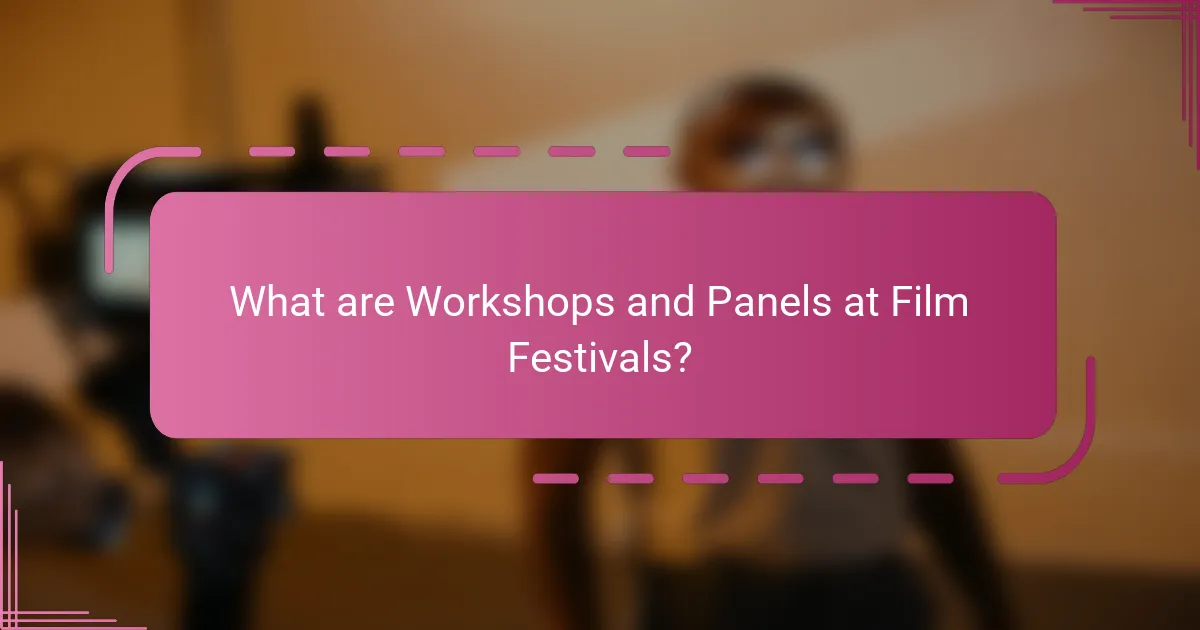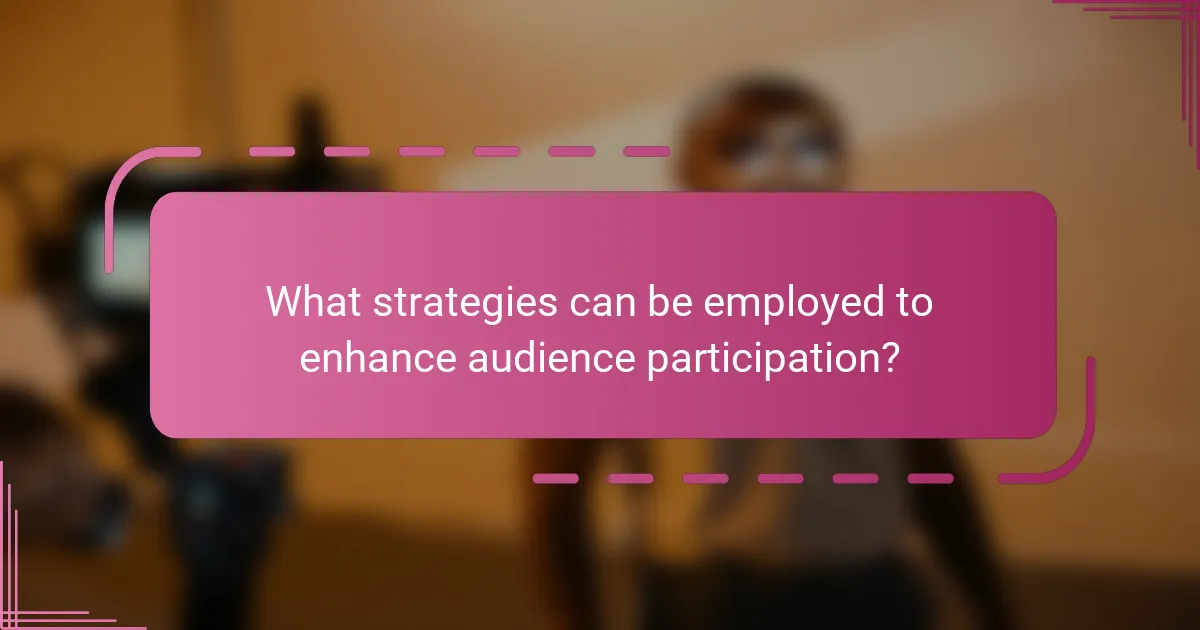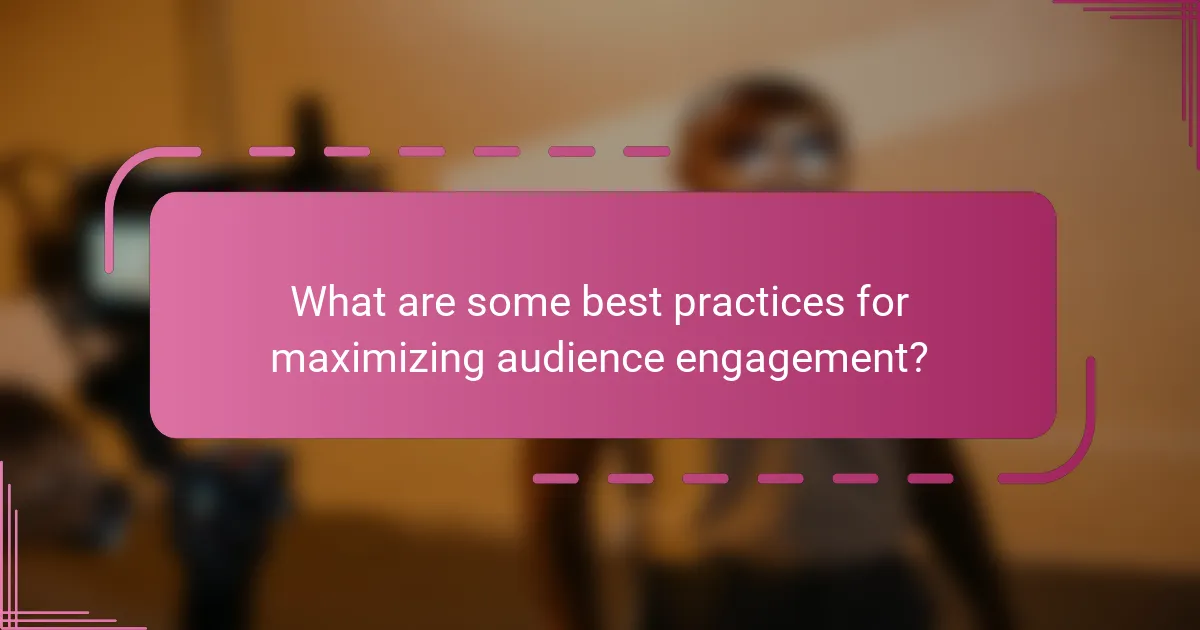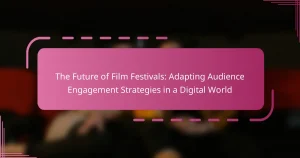Workshops and panels at film festivals serve as interactive sessions aimed at enhancing attendee engagement and education. Workshops focus on skill development in areas such as screenwriting, directing, and cinematography, while panels feature expert discussions on various film-related topics, often incorporating audience Q&A segments. Effective audience participation is crucial, with strategies including interactive activities, clear communication, tailored content, and the use of social media for real-time interaction. Research indicates that events with these interactive components can significantly boost audience engagement, making film festival workshops and panels vital for networking and knowledge sharing within the industry.

What are Workshops and Panels at Film Festivals?
Workshops and panels at film festivals are interactive sessions designed to engage attendees. Workshops provide hands-on learning experiences, often led by industry professionals. They focus on specific skills, such as screenwriting, directing, or cinematography. Panels consist of discussions featuring experts discussing various topics related to film. These sessions often include Q&A segments, allowing audience participation. Both formats enhance networking opportunities and knowledge sharing. They contribute to the overall educational aspect of film festivals, making them more than just screening events.
How do Workshops and Panels enhance audience participation?
Workshops and panels enhance audience participation by creating interactive environments. These formats encourage active engagement through discussions and hands-on activities. Participants can ask questions and share insights, fostering a sense of community. Workshops often involve practical exercises that allow attendees to apply concepts in real-time. Panels provide diverse perspectives from experts, sparking dialogue among audience members. Research shows that interactive sessions increase retention of information by up to 70%. Engaging formats lead to higher satisfaction rates, with surveys indicating that 85% of attendees prefer interactive sessions over traditional lectures.
What types of workshops are typically offered at film festivals?
Film festivals typically offer a variety of workshops. Common types include screenwriting workshops, which focus on storytelling techniques and script development. Filmmaking workshops teach participants about directing, cinematography, and production processes. Editing workshops provide insights into post-production techniques and software usage. Additionally, workshops on acting help participants develop performance skills. Some festivals also host workshops on marketing and distribution strategies for films. These workshops are designed to enhance skills and knowledge within the film industry.
How do panels facilitate audience engagement during film festivals?
Panels facilitate audience engagement during film festivals by providing interactive discussions with filmmakers and industry experts. These sessions allow audiences to ask questions directly, fostering a sense of connection. Panels often cover various topics, enhancing knowledge about film production, storytelling, and industry trends. Engaging formats like Q&A sessions encourage participation and dialogue. Research indicates that interactive sessions increase audience satisfaction and retention of information. For example, a study by the University of Southern California found that 70% of attendees felt more engaged after participating in panel discussions. This engagement can lead to deeper appreciation and understanding of the films presented.
What is the significance of audience participation in film festivals?
Audience participation in film festivals is significant because it fosters community engagement and enhances the festival experience. Engaged audiences contribute to discussions, providing diverse perspectives that enrich the overall dialogue. This interaction can lead to networking opportunities for filmmakers and attendees alike. Additionally, audience feedback can influence future projects and programming decisions. Studies have shown that festivals with high audience involvement often see increased ticket sales and repeat attendance. Engaging audiences also creates a sense of ownership and investment in the festival, leading to loyal followings. Ultimately, audience participation is vital for the vibrancy and sustainability of film festivals.
Why is audience interaction important for filmmakers and participants?
Audience interaction is crucial for filmmakers and participants because it fosters engagement and feedback. Engaged audiences provide valuable insights that can enhance the filmmaking process. Filmmakers can gauge audience reactions in real-time, allowing for adjustments and improvements. Interactive sessions also create a sense of community among participants. This connection can lead to networking opportunities and collaborations. Studies show that films with audience feedback often perform better in festivals and screenings. Furthermore, audience interaction cultivates a deeper appreciation for the art of filmmaking. It transforms passive viewers into active participants, enriching the overall experience for everyone involved.
How does audience participation influence the overall festival experience?
Audience participation significantly enhances the overall festival experience. Engaged attendees contribute to a lively atmosphere. Their involvement fosters a sense of community among participants. Active participation can lead to more dynamic discussions during panels and workshops. This interaction often results in richer content and diverse perspectives. Studies show that festivals with high audience engagement report increased satisfaction levels. For instance, a survey by Eventbrite found that 78% of attendees felt more connected to events when they participated actively. This connection can lead to greater loyalty and repeat attendance. Thus, audience participation is crucial for creating memorable festival experiences.

What strategies can be employed to enhance audience participation?
Engaging audiences effectively is crucial for enhancing participation at film festival workshops and panels. Implementing interactive activities, such as Q&A sessions, encourages audience involvement. Incorporating live polls or surveys during discussions can provide real-time feedback and foster engagement. Utilizing social media platforms allows participants to share thoughts and questions, creating a dialogue beyond the event. Offering incentives, like giveaways or exclusive content, can motivate attendance and involvement. Creating a welcoming atmosphere where audience members feel valued and heard is essential. Research shows that events with interactive components see a 30% increase in audience engagement.
How can film festivals design effective workshops?
Film festivals can design effective workshops by aligning them with audience interests and industry trends. Engaging topics attract participants and foster meaningful discussions. Inviting experienced facilitators enhances the learning experience. Workshops should incorporate hands-on activities for practical application. Clear objectives guide participants towards specific outcomes. Scheduling workshops during peak festival hours maximizes attendance. Providing diverse formats caters to different learning styles. Collecting feedback post-workshop helps improve future sessions. These strategies have proven successful in increasing participant satisfaction and engagement at various film festivals.
What key elements should be included in workshop planning?
Key elements in workshop planning include clear objectives, a defined target audience, and a structured agenda. Objectives should outline the desired outcomes of the workshop. Identifying the target audience ensures the content is relevant and engaging. A structured agenda helps maintain focus and time management. Additionally, selecting qualified facilitators enhances the workshop’s effectiveness. Incorporating interactive activities fosters participation and engagement. Finally, gathering feedback post-workshop is crucial for future improvements. These elements collectively contribute to a successful workshop experience.
How can facilitators encourage active participation in workshops?
Facilitators can encourage active participation in workshops by creating an inclusive environment. Establishing ground rules early fosters a sense of safety. Encouraging questions and feedback promotes engagement. Utilizing interactive activities, such as group discussions, enhances involvement. Incorporating technology, like polls or apps, can stimulate participation. Providing clear objectives helps participants understand their roles. Facilitators should actively listen and validate contributions. Research shows that interactive workshops lead to higher satisfaction and learning outcomes.
What role do panels play in promoting discussion among audiences?
Panels serve as platforms for facilitating discussion among audiences. They bring together experts and participants to share insights. This interaction encourages diverse perspectives on topics. Audiences engage through questions and comments. The format fosters a sense of community. Research shows that panels can significantly increase audience involvement. For instance, a study by the National Endowment for the Arts highlights increased engagement in cultural discussions following panel events. This active participation enhances the overall experience for attendees.
How can panel discussions be structured for maximum engagement?
Panel discussions can be structured for maximum engagement by incorporating interactive elements and clear frameworks. Start with a diverse panel that includes experts with varying perspectives. This diversity fosters richer discussions and keeps the audience interested.
Next, establish a clear agenda to guide the conversation. A well-defined structure helps participants stay focused and engaged. Incorporate audience participation through Q&A sessions or live polling. This interaction encourages attendees to share their thoughts and questions.
Utilizing engaging visuals or multimedia can also enhance the discussion. Visual aids help illustrate points and maintain audience attention. Finally, allow for informal networking opportunities post-discussion. This encourages further interaction and engagement among participants and attendees.
What techniques can moderators use to stimulate audience questions?
Moderators can use several techniques to stimulate audience questions. One effective method is to create an inviting atmosphere. This can be achieved by encouraging audience members to share their thoughts openly. Another technique is to ask open-ended questions. These types of questions require more than a yes or no answer, prompting deeper engagement.
Moderators can also use prompts related to the discussion topic. This helps guide the audience’s thinking and encourages them to formulate questions. Additionally, incorporating interactive elements, such as live polls or Q&A sessions, can stimulate audience participation.
Offering incentives for questions, like small prizes or recognition, can also motivate attendees to engage. Finally, moderators should demonstrate active listening. Acknowledging audience contributions fosters a sense of value and encourages further inquiries.

What are some best practices for maximizing audience engagement?
Engaging audiences effectively requires interactive elements, clear communication, and tailored content. Interactive elements, such as Q&A sessions and live polls, encourage participation. Clear communication ensures that messages are easily understood. Tailoring content to the audience’s interests increases relevance and connection. Additionally, utilizing social media for real-time engagement enhances participation. According to a study by the Event Marketing Institute, 74% of attendees feel more engaged when they can participate actively. Therefore, implementing these practices can significantly enhance audience engagement at film festival workshops and panels.
How can technology be leveraged to enhance participation?
Technology can enhance participation by facilitating real-time interaction and engagement. Tools like live polling and Q&A platforms allow audience members to contribute their opinions instantly. Virtual reality can create immersive experiences, making participation more engaging. Social media enables broader audience reach and interaction before, during, and after events. Mobile applications can provide personalized content and notifications, enhancing user experience. Data analytics can track audience engagement, informing organizers on how to improve future events. According to a study by Eventbrite, events that utilize technology see a 25% increase in audience engagement.
What tools and platforms can be utilized for audience interaction?
Tools and platforms for audience interaction include social media, live polling, and Q&A apps. Social media platforms like Twitter and Instagram allow real-time engagement. Live polling tools such as Slido or Mentimeter enable instant feedback. Q&A apps facilitate audience questions during panels. These tools enhance participation and create a dynamic experience. Studies show that interactive sessions increase audience satisfaction and retention.
How can social media enhance the reach and engagement of workshops and panels?
Social media can significantly enhance the reach and engagement of workshops and panels. It allows for real-time interaction between participants and presenters. Platforms like Twitter and Instagram can be used to share live updates and insights. This immediacy encourages audience participation and feedback. Hashtags can create a sense of community around the event. They enable attendees to share their experiences and connect with others. Social media also facilitates the promotion of events to wider audiences. Research shows that events promoted on social media see increased attendance by up to 30%. This demonstrates the effectiveness of social media in expanding event visibility and engagement.
What tips can organizers follow to improve audience experiences?
Organizers can improve audience experiences by focusing on engagement, accessibility, and feedback. Engaging the audience can be achieved through interactive activities and Q&A sessions. Incorporating technology, such as live polling, can enhance participation. Ensuring accessibility involves providing clear signage and accommodating diverse needs. Offering a variety of workshops can cater to different interests. Gathering feedback through surveys post-event can help identify areas for improvement. A study by Eventbrite found that 70% of attendees prefer interactive experiences over passive ones. This highlights the importance of engagement strategies.
How can feedback be effectively gathered from participants post-event?
Feedback can be effectively gathered from participants post-event through structured surveys and interviews. Surveys can be distributed immediately after the event via email or digital platforms. These surveys should include both quantitative and qualitative questions to capture a range of opinions. Quantitative questions can use a Likert scale for ease of analysis. Qualitative questions should allow for open-ended responses to gather detailed insights.
Interviews can also be conducted with a select group of participants for in-depth feedback. This method provides a personal touch and can uncover nuanced perspectives. Additionally, utilizing social media platforms can facilitate informal feedback. Participants can share their thoughts in real-time, which can be monitored for trends and sentiments.
According to research by the Event Marketing Institute, 74% of event attendees prefer to provide feedback through digital surveys immediately after the event. This statistic underscores the effectiveness of timely feedback collection methods.
What common challenges should organizers anticipate and address?
Organizers should anticipate and address logistical challenges when planning workshops and panels at film festivals. These challenges include venue selection, scheduling conflicts, and technical issues. Venue selection can affect audience engagement and comfort. Scheduling conflicts may arise with multiple events occurring simultaneously. Technical issues can disrupt presentations and diminish audience experience. Additionally, organizers must consider speaker availability and travel arrangements. Audience engagement strategies must be developed to encourage participation. Finally, feedback mechanisms should be in place to assess and improve future events.
The main entity of the article is “audience participation” at film festivals, specifically through workshops and panels. The article provides an overview of how these interactive sessions enhance engagement, knowledge sharing, and networking opportunities among attendees. It discusses various types of workshops, the significance of audience interaction for filmmakers, and strategies to maximize participation, including the use of technology and feedback mechanisms. Additionally, it addresses the challenges organizers may face and offers best practices for creating effective and engaging sessions.


